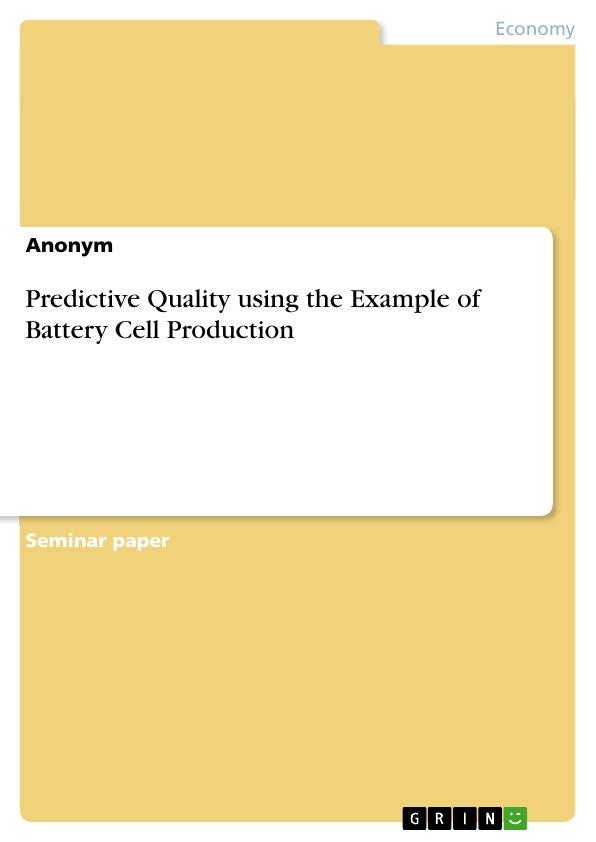Climate change promotes the emergence of new concepts for mobility in order to reduce CO2 emissions and minimize the consumption of fossil fuels. As a result, more and more automotive companies are changing their portfolios from internal combustion engines to electric motors due to legal requirements of the EU. This also means that the energy source of automobiles is changing from diesel or gasoline to electrical energy. Battery cells are needed to store this energy in the car. The battery cells can in turn be used to build battery modules and battery packs. The demand for batteries is increasing worldwide. This also creates new requirements for quality and efficiency. In addition, the degree of digitalization in manufacturing industries, such as car manufacturers, continues to increase. The quality of the batteries can be guaranteed with different methods. One method is predictive quality, which can be used to predict quality in advance. But which process steps in battery cell production benefit from this quality method?
Inhaltsverzeichnis (Table of Contents)
- 1 Introduction
- 2 Theoretical foundations
- 2.1 Battery cell production
- 2.2 Quality management
- 2.3 Predictive Quality
- 3 Battery cell production with predictive quality
- 3.1 Requirements for a battery system
- 3.2 Quality planning
- 3.3 Quality inspection
- 3.4 Quality control
- 3.5 Quality assurance
- 3.6 Evaluation
- 4 Conclusion
Zielsetzung und Themenschwerpunkte (Objectives and Key Themes)
This paper explores the application of predictive quality in battery cell production. The objective is to identify specific process steps in battery cell production that benefit from this quality method and discuss the advantages and challenges associated with its implementation. The paper aims to contribute to understanding the role of predictive quality in ensuring the quality and efficiency of battery cell production.
- The growing demand for batteries and the increasing digitalization in manufacturing industries.
- The importance of quality assurance in battery cell production.
- The concept of predictive quality and its potential benefits.
- The specific process steps in battery cell production that can be enhanced by predictive quality.
- The challenges and considerations for implementing predictive quality in battery cell production.
Zusammenfassung der Kapitel (Chapter Summaries)
The first chapter introduces the context of the paper, highlighting the increasing demand for batteries and the role of quality assurance in battery cell production. Chapter 2 provides a theoretical foundation, discussing battery cell production, quality management, and the concept of predictive quality. It also explores the various types of battery cells and the importance of quality in battery systems for electric vehicles. Chapter 3 delves into the application of predictive quality in battery cell production, focusing on the requirements for battery systems, quality planning, inspection, control, assurance, and evaluation.
Schlüsselwörter (Keywords)
The key terms and focus topics of this paper include battery cell production, predictive quality, quality management, e-mobility, battery systems, digitalization, and manufacturing industries.
Frequently Asked Questions
What is Predictive Quality?
Predictive Quality is a method that uses data and digitalization to predict the quality of a product in advance, allowing for adjustments before defects occur.
Why is quality assurance critical in battery cell production?
Battery cells are the primary energy source for electric vehicles; their integrity and performance are essential for safety, reliability, and meeting legal requirements.
Which process steps in battery production benefit from Predictive Quality?
The paper identifies specific steps in quality planning, inspection, and control where predictive models can enhance efficiency and output.
How does e-mobility influence battery demand?
EU legal requirements and the shift from combustion engines to electric motors have led automotive companies to increase battery production significantly.
What is the difference between battery cells, modules, and packs?
Battery cells are the individual units; multiple cells are combined into modules, and modules are then assembled into battery packs for use in cars.
What role does digitalization play in modern manufacturing?
Digitalization allows for real-time monitoring and the implementation of advanced quality methods like Predictive Quality to optimize production cycles.
- Quote paper
- Anonym (Author), Predictive Quality using the Example of Battery Cell Production, Munich, GRIN Verlag, https://www.hausarbeiten.de/document/1376855


